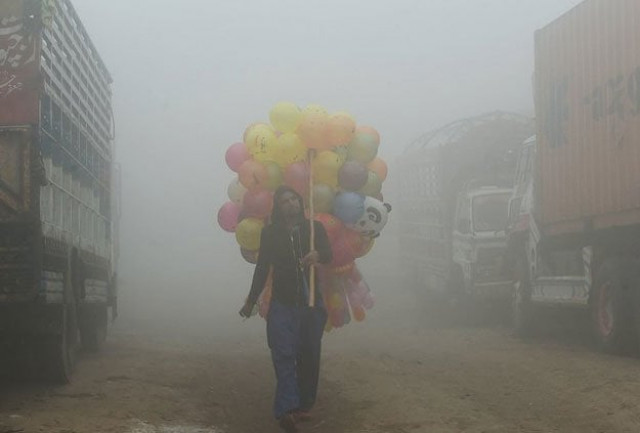Panel recommends talks with India on environment
Judicial commission on smog submits report in SC

PHOTO: AFP
“The commission acknowledges that smog is a regional problem and it cannot be effectively controlled by eliminating local sources of pollution alone,” the commission said while submitting its report in the Supreme Court.
“A comprehensive solution to this requires a cooperative approach at regional level. For this purpose, the federal government may be directed to put environmental concerns on the agenda of bilateral and multilateral dialogues between India and Pakistan.
“A good example of regional environmental cooperation is the Agreement on Trans-boundary Haze Pollution concluded between ten ASEAN countries in 2002,” says the 13-member judicial commission, headed by senior lawyer Dr Pervez Hassan in its report.
The commission was given the task to combat smog and formulate smog policy for Punjab, identify the root causes and prescribe a plan to protect and safeguard the life and health in the province.
The report says that Punjab experiences low visibility from October to February which is also called winter smog. “Non-availability of reliable air quality observations is a serious challenge.”
It also points out industrial facilities, particularly those consuming fossil fuel, emit significant amounts of air pollutants.
Air quality is further exacerbated by widespread use of small diesel electric generators in residential areas in the wake of electricity outages. “Poor maintenance of boiler is another source of air pollution.”
The commission has also suggested short- and long-term plan to improve the air situation. It is proposed that there is a need to introduce low-sulfur fuel in the country.
It is also recommended that there is a need to adopt Euro-II emission standards for petrol-driven vehicles. Likewise it is stated that experience indicates that ‘particulate matter’ (PM) emissions can also be reduced by better traffic control by restricting numbers of vehicles plying on the road.
It is also pointed out that the provincial agriculture departments should educate farmers on fertility losses due to burning of crops.
The commission says, “Trees are most cheap and highly effective environmentally-safe agents to fix carbon and other noxious elements. Unfortunately trees are the victim of unplanned urban development. The Environmental Protection Agency should work along with the Board of Revenue and the Forest Department for tree plantation.
The commission also noted that the brick manufacturing sector in Pakistan is still unregulated and undocumented. “Most of brick kilns are situated around urban centres.”
The report pointed out that the Punjab Green Development Programme has been introduced with the assistance of World Bank for the improvement of air pollution.
“The commission has recommended immediate implementation of the Punjab Green Development Programme.”
The commission recommended that steel rerolling mills should be given a grace period till September 2018 to convert to cleaner technology.
In addition, it also proposed that the initiative of sustainable rice should be encouraged in Pakistan which requires exporters to stop burning rice stubble, adding that the Brick Kiln Owners Association agreed to shut down all brick kilns during the winter smog season.
The commission also recommended that prohibition of burning municipal waste under the Punjab Local Government Act 2013 should be implemented.



















COMMENTS
Comments are moderated and generally will be posted if they are on-topic and not abusive.
For more information, please see our Comments FAQ